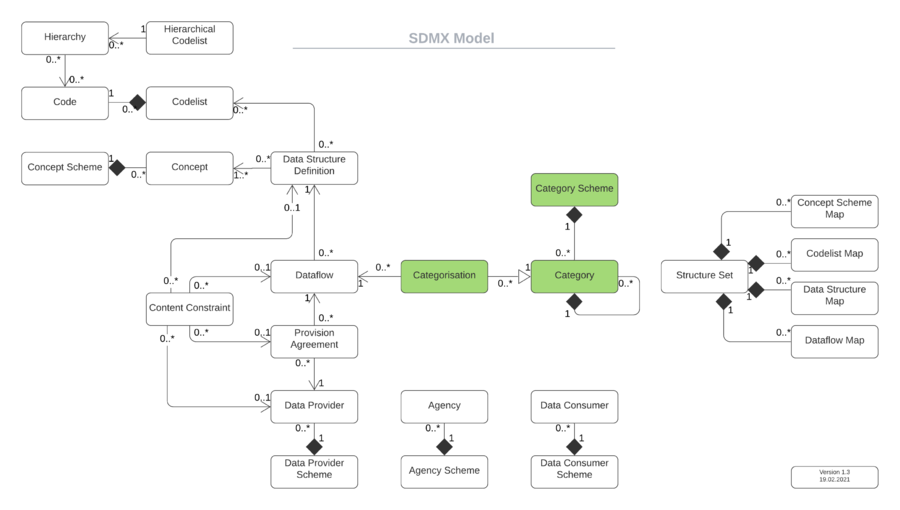Difference between revisions of "Category Scheme V10"
(→Flat Concept Schemes) |
|||
| Line 52: | Line 52: | ||
|} | |} | ||
| − | =Flat | + | =Flat Category Schemes= |
| − | <p>Flat | + | <p>Flat Category Schemes are simple lists of codes with no explicit or implied relationships or hierarchies.</p> |
| − | <p> Example | + | <p> Example Category Scheme</p> |
{| class="wikitable" | {| class="wikitable" | ||
|- | |- | ||
! Code ID !! Code Name !! Description | ! Code ID !! Code Name !! Description | ||
|- | |- | ||
| − | | | + | | PUBLIC || Public Sector || Artefacts relating to the Public Sector. |
|- | |- | ||
| − | | | + | | PRIVATE || Private Sector || Artefacts relating to the Private Sector |
| − | |||
| − | |||
| − | |||
| − | |||
| − | |||
| − | |||
|- | |- | ||
|} | |} | ||
| + | |||
=Concept Schemes with Simple Hierarchies= | =Concept Schemes with Simple Hierarchies= | ||
<p>SDMX allows simple hierarchies to be defined within flat Concept Schemes by making a code the parent of codes that logically sit under it in the hierarchy.</p> | <p>SDMX allows simple hierarchies to be defined within flat Concept Schemes by making a code the parent of codes that logically sit under it in the hierarchy.</p> | ||
Revision as of 07:13, 20 February 2021
Contents
Overview
A Category Scheme is a container for Categories. An example of a category scheme is one which categorises data - sometimes known as subject matter domain scheme or a data category scheme. The individual Categories can be associated to any set of identifiable Artefacts, known as a Categorisation.
Structure Properties
| Structure Type | Standard SDMX Structural Metadata Artefact |
|---|---|
| Maintainable | Yes |
| Identifiable | Yes |
| Item Scheme | Yes |
| SDMX Information Model Versions | 2.0, 2.1 |
| URN - CategoryScheme namespace | urn:sdmx:org.sdmx.infomodel.categorycheme.CategoryScheme |
| URN - categorisation namespace | urn:sdmx:org.sdmx.infomodel.categorycheme.Categorisation |
Context within the SDMX 2.1 Information Model
The schematic illustrates the core artefacts of the SDMX 2.1 Information Model, and how Category Schemes, Categorys and Categorisations fit in.
Usage
Categories are used within a Category Scheme and has the facility to have one or more child codes as well as being multi-lingual.
The SDMX Cross Domain Concept Scheme provides a range of standardised Concepts maintained by the SDMX Statistical Working Group (SWG) and can be viewed on the Global Registry site https://registry.sdmx.org/items/conceptscheme.html.
More information on Category schemes can be found in this article.
Conventions
Category Scheme IDs IDs are conventionally uppercase using underscores '_' as separators if required. Examples:
| Agency | Category Scheme ID ID | Description | SDMX-ML |
|---|---|---|---|
| ESTAT | ESA2010TP | ESA 2010 - Transmission programme | [ https://registry.sdmx.org/ws/public/sdmxapi/rest/categoryscheme/ESTAT/ESA2010TP/1.0 SDMX-ML] |
| SDMX | STAT_SUBJECT_MATTER | SDMX Statistical Subject-Matter Domains | [ https://registry.sdmx.org/ws/public/sdmxapi/rest/categoryscheme/SDMX/STAT_SUBJECT_MATTER/1.0 SDMX-ML] |
Flat Category Schemes
Flat Category Schemes are simple lists of codes with no explicit or implied relationships or hierarchies.
Example Category Scheme
| Code ID | Code Name | Description |
|---|---|---|
| PUBLIC | Public Sector | Artefacts relating to the Public Sector. |
| PRIVATE | Private Sector | Artefacts relating to the Private Sector |
Concept Schemes with Simple Hierarchies
SDMX allows simple hierarchies to be defined within flat Concept Schemes by making a code the parent of codes that logically sit under it in the hierarchy.
Imagine a Concept Scheme including a Concept 'CONTACT' containing individual codes for details such as Name, Address, and Email etc. A simple hierarchy for CONTACT can be created by setting CONTACT as the parent for each of the Contact detail codes:
| Code ID | Code Name | Parent |
|---|---|---|
| CONTACT | Contact | (none) |
| CONTACT_NAME | Contact name | CONTACT |
